心理评估 英文
心理学专业名词中英文对照
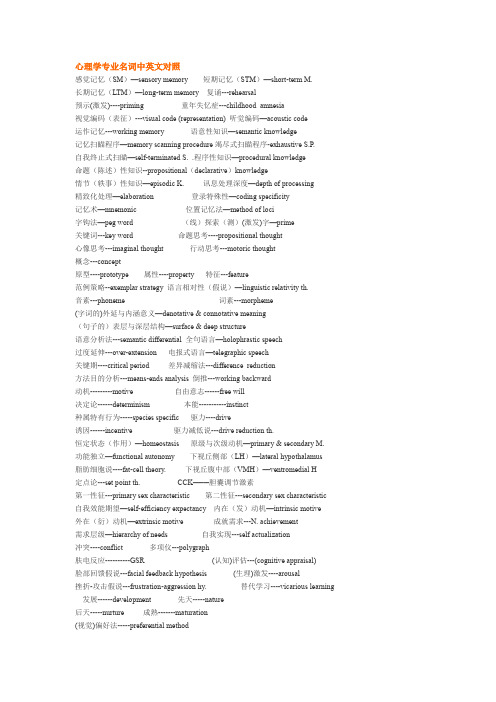
心理学专业名词中英文对照感觉记忆(SM)—sensory memory 短期记忆(STM)—short-term M.长期记忆(LTM)—long-term memory 复诵---rehearsal预示(激发)----priming 童年失忆症---childhood amnesia视觉编码(表征)---visual code (representation) 听觉编码—acoustic code运作记忆---working memory 语意性知识—semantic knowledge记忆扫瞄程序—memory scanning procedure竭尽式扫瞄程序-exhaustive S.P.自我终止式扫瞄—self-terminated S. .程序性知识—procedural knowledge命题(陈述)性知识--propositional(declarative)knowledge情节(轶事)性知识—episodic K. 讯息处理深度—depth of processing精致化处理—elaboration 登录特殊性—coding specificity记忆术—mnemonic 位置记忆法—method of loci字钩法—peg word (线)探索(测)(激发)字—prime关键词---key word 命题思考----propositional thought心像思考---imaginal thought 行动思考---motoric thought概念---concept原型----prototype 属性----property 特征---feature范例策略--exemplar strategy 语言相对性(假说)—linguistic relativity th.音素---phoneme 词素---morpheme(字词的)外延与内涵意义—denotative & connotative meaning(句子的)表层与深层结构—surface & deep structure语意分析法---semantic differential 全句语言—holophrastic speech过度延伸---over-extension 电报式语言—telegraphic speech关键期----critical period 差异减缩法---difference reduction方法目的分析---means-ends analysis 倒推---working backward动机---------motive 自由意志------free will决定论------determinism 本能-----------instinct种属特有行为-----species specific 驱力----drive诱因------incentive 驱力减低说---drive reduction th.恒定状态(作用)—homeostasis 原级与次级动机—primary & secondary M.功能独立—functional autonomy 下视丘侧部(LH)—lateral hypothalamus脂肪细胞说----fat-cell theory. 下视丘腹中部(VMH)—ventromedial H定点论---set point th. CCK───胆囊调节激素第一性征---primary sex characteristic第二性征---secondary sex characteristic自我效能期望—self-efficiency expectancy内在(发)动机—intrinsic motive外在(衍)动机—extrinsic motive成就需求---N. achievement需求层级—hierarchy of needs 自我实现---self actualization冲突----conflict 多项仪---polygraph肤电反应----------GSR (认知)评估---(cognitive appraisal)脸部回馈假说---facial feedback hypothesis (生理)激发----arousal挫折-攻击假说---frustration-aggression hy. 替代学习----vicarious learning 发展------development 先天-----nature后天-----nurture 成熟-------maturation(视觉)偏好法-----preferential method习惯法-----habituation 视觉悬崖-----visual cliff剥夺或丰富(环境)---deprivation or enrichment of env. 基模----schema同化----assimilation 调适-----accommodation 平衡----equilibrium 感觉动作期----sensorimotor stage 物体永久性----objective permanence运思前期----preoperational st. 保留概念----conservation道德现实主义---moral realism 具体运思期-----concrete operational形式运思期----formal operational st. 前俗例道德---pre-conventional moral俗例道德----conventional moral 超俗例道德----post-conventional moral气质----temperament 依附---attachment 性别认定---gender identity性别配合----sex typing 性蕾期---phallic stage 恋亲冲突—Oedipal conflict认同-----identification 社会学习----social learning 情结---complex性别恒定----gender constancy 青年期----adolescence 青春期-- -puberty第二性征---secondary sex characteristics 认同危机---identity crisis定向统合---identity achievement 早闭型统合---foreclosure未定型统合---moratorium 迷失型统合---identity diffusion传承---generativity心理动力------psycho-dynamics 心理分析------psychoanalysis行为论-------behaviorism 心理生物观---psycho-biological perspective 认知---------cognition 临床心理学家-clinical psychologist谘商--------counseling 人因工程-------human factor engineering组织--------organization 潜意识---------unconsciousness完形心理学---Gestalt psychology 感觉------------sensation知觉--------perception 实验法--------experimental method独变项-------independent variable 依变项--------dependent V.控制变项------control V. 生理------------physiology条件化---------conditioning 学习------------learning比较心理学---comparative psy. 发展-------------development社会心理学---social psy. 人格--------------personality心理计量学—psychometrics 受试(者)---------subject实验者预期效应—experimenter expectancy effect双盲法-----double—blind 实地实验--------field experiment相关-----------correlation 调查-------------survey访谈-----------interview 个案研究-------case study观察-----------observation 心理测验-------psychological test纹理递变度-----texture gradient 注意------------attention物体的组群---grouping of object 型态辨识—pattern recognition形象-背景----figure-ground 接近律--------proximity相似律--------similarity 闭合律-------closure连续律--------continuity 对称律-------symmetry错觉-----------illusion 幻觉----------delusion恒常性--------constancy 大小----------size形状-----------shape 位置---------- location单眼线索-----monocular cue 线性透视----linear- perspective双眼线索-----binocular cue 深度---------depth调节作用-----accommodation 重迭----superposition双眼融合-----binocular fusion 辐辏作用-----convergence双眼像差-----binocular disparity 向度--------- dimension自动效应-----autokinetic effect 运动视差----- motion parallax诱发运动---- induced motion 闪光运动----- stroboscopic motion上下文﹑脉络-context 人工智能------artificial intelligence A.I.脉络关系作用-context effect 模板匹配------template matching整合分析法---analysis-by-synthesis 丰富性---------redundancy选择性---------selective 无意识的推论-unconscious inferences运动后效---motion aftereffect 特征侦测器—feature detector激发性---excitatory 抑制性----inhibitory几何子---geons 由上而下处理—up-down process由下而上处理---bottom-up process 连结者模式---connectionist model联结失识症---associative agnosia 脸孔辨识困难症---prosopagnosia意识--conscious(ness)意识改变状态---altered states of consciousness无意识----unconsciousness 前意识---------preconsciousness内省法---introspection 边缘注意---peripheral attention多重人格-----multiple personality午餐排队(鸡尾酒会)效应—lunch line(cocktail party) effect自动化历程----automatic process解离----dissociate 解离认同失常----dissociative identity disorder 快速眼动睡眠----REM dream非快速眼动睡眠—NREM dream神志清醒的梦----lucid dreaming 失眠---insomnia显性与隐性梦---manifest & latern content 心理活动性psychoactive冥想------meditation 抗药性---- tolerance 戒断----withdrawal感觉剥夺---sensory deprivation 物质滥用----substance abuse成瘾--------physical addiction 物质依赖----sub. dependence戒断症状----withdrawal symptom 兴奋剂--stimulant幻觉(迷幻)剂----hallucinogen 镇定剂---sedative﹐抑制剂--depressant 酒精中毒引起谵妄—delirium tremens麻醉剂---narcotic 催眠-------hypnosis催眠后暗示----posthypnotic suggestion 催眠后失忆 posthypnotic amnesia超心理学---parapsychology 超感知觉extrasensory perception ESP心电感应---telepathy 超感视---clairvoyance 预知---precognition心理动力—psycokinesis PK 受纳器-----receptor 绝对阈----absolute threshold 差异阈----------difference threshold 恰辨差------- -JND韦伯律---------Weber's law 心理物理-----psychophysical费雪纳定律---Fechner's law频率-----frequency振幅----------amplitude 音频-------pitch基音----------fundamental tone 倍音-----overtone和谐音-------harmonic 音色------timbre白色噪音----white noise 鼓膜-----eardrum耳蜗----------cochlea 卵形窗—oval window圆形窗-------round window 前庭-----vestibular sacs半规管-------semicircular canals 角膜-------cornea水晶体-------lens 虹膜------------iris瞳孔----------pupil 网膜---------retina睫状肌-------ciliary muscle 调节作用---accommodation脊髓---------spinal cord 反射弧--------reflex arc脑干---------brain stem 计算机轴性线断层扫描-- CA T 或CTPET---正子放射断层摄影 MRI-----磁共振显影延脑----medulla 桥脑-----pons 小脑----cerebellum网状结构---reticular formation RAS----网状活化系统视丘----thalamus 下视丘----hypothalamus大脑----cerebrum 脑(下)垂体(腺)—pituitary gland脑半球---cerebral hemisphere 皮质---cortex胼胝体----corpus callosum 边缘系统------limbic system海马体----hippocampus 杏仁核--------amygdala中央沟---central fissure 侧沟-----------lateral fissure脑叶------lobe 同卵双生子----identical twins异卵双生子—fraternal twins古典制约--classical conditioning 操作制约---operant conditioning非制约刺激—(US unconditioned stimulus非制约反应—(UR)unconditioned R. 制约刺激---(CS) conditioned S. 制约反应----(CR)conditioned R.习(获)得-----acquisition 增强作用------reinforcement消除(弱)------extinction 自(发性)然恢复----spontaneous recovery前行制约—forward conditioning 同时制约--simultaneous conditioning回溯制约---backward cond. 痕迹制约——trace conditioning延宕制约—delay conditioning 类化(梯度)---generalization (gradient)区辨------discrimination (次级)增强物-------(secondary) reinforcer嫌恶刺激---aversive stimulus 试误学习---trial and error learning效果率-----law of effect 正(负)性增强物—positive (negative) rei.行为塑造—behavior shaping 循序渐进-----successive approximation自行塑造—autoshaping 部分(连续)增强—partial (continuous)R定比(时)时制—fixed ratio (interval) schedule FR或FI变化比率(时距)时制—variable ratio (interval) schedule VR或VI逃离反应---escape R. 回避反应—avoidance response习得无助----learned helplessness 顿悟--------insight学习心向—learning set 隐内(潜在)学习---latent learning认知地图---cognitive map 生理回馈------biofeedback敏感递减法-systematic desensitization 普里迈克原则—Premack's principle洪水法----flooding 观察学习----observational learning动物行为学----ethology 敏感化—sensitization习惯化---habituation 联结---association认知学习----cognitional L. 观察学习---observational L.登录﹑编码----encoding 保留﹑储存-----retention提取------retrieval 回忆----(free recall全现心像﹑照相式记忆---eidetic imagery﹑photographic memory.舌尖现象(TOT)—tip of tongue 再认---------recognition再学习--------relearning 节省分数----savings外显与内隐记忆--explicit & implicit memory 记忆广度---memory span组集--chunk 序列位置效应---serial position effect起始效应---primacy effect 新近效应-----recency effect心(情)境依赖学习---state-dependent L. 无意义音节—nonsense syllable顺向干扰---proactive interference 逆向干扰---retroactive interference闪光灯记忆---flashbulb memory 动机性遗忘----motivated forgetting器质性失忆症—organic amnesia 阿兹海默症---Alzheimer"s disease近事(顺向)失忆症—anterograde amnesia旧事(逆向)失忆—retrograde A. 高沙可夫症候群—korsakoff"s syndrome 凝固理论—consolidation th.。
心理学专业英语
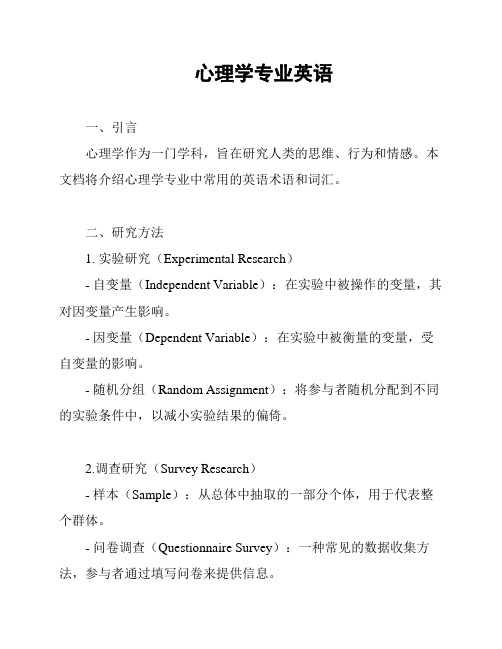
心理学专业英语一、引言心理学作为一门学科,旨在研究人类的思维、行为和情感。
本文档将介绍心理学专业中常用的英语术语和词汇。
二、研究方法1. 实验研究(Experimental Research)- 自变量(Independent Variable):在实验中被操作的变量,其对因变量产生影响。
- 因变量(Dependent Variable):在实验中被衡量的变量,受自变量的影响。
- 随机分组(Random Assignment):将参与者随机分配到不同的实验条件中,以减小实验结果的偏倚。
2.调查研究(Survey Research)- 样本(Sample):从总体中抽取的一部分个体,用于代表整个群体。
- 问卷调查(Questionnaire Survey):一种常见的数据收集方法,参与者通过填写问卷来提供信息。
三、主要理论1.行为主义(Behaviorism)- 刺激-反应(Stimulus-Response):行为主义认为,行为是对刺激的直接反应。
2.认知心理学(Cognitive Psychology)- 情绪(Emotion):主观体验和生理反应的一种状态,通常与特定刺激有关。
- 记忆(Memory):对于信息的编码、存储和检索能力。
- 研究(Learning):通过经验和实践获取知识和技能的过程。
四、发展领域1.临床心理学(Clinical Psychology)- 临床评估(Clinical Assessment):通过各种测试和观察手段,评估个体的心理状况。
- 治疗(Therapy):利用心理和行为干预手段,帮助个体解决心理困扰。
2.社会心理学(Social Psychology)- 社会认知(Social Cognition):研究个体如何感知、记忆和思考与他人相关的信息。
五、结论本文档提供了心理学专业常用英语术语和词汇的简要介绍,希望能帮助读者更好地理解和研究心理学领域的知识。
参考文献:- Smith, J. (2010). Introduction to Psychology. Publisher.- Johnson, L. (2015). Key Concepts in Cognitive Psychology. Publisher.。
EQ是Emotional Quotient的英文缩写

EQ是Emotional Quotient的英文缩写。
汉语意思是:“情绪智慧”或“情绪智商”,简称情商。
是美国心理学家丹尼尔·戈尔曼在1995年提出来的。
它代表的是一个人的情绪智力(Emotional Intelligence)之能力。
是指管理自己的情绪和处理人际关系的能力,包括自我意识、自我激励、自我控制、移情交流、人际技能。
戈尔曼强调,情商在个人发展、人际互动和组织管理中具有重要的作用。
通常,在大型企业公司的面试上,都会测试情商。
eqemotion quotient的简称,译成汉语有:“情绪商数”、“情感智商”、“情感智慧”、“心理能力指数”等4种。
,是测定和描述人的情绪、情感的一种量化指标,指一个人运用理智控制情感和操纵行为的能力。
情商是一种洞察人生价值、揭示人生目标的悟性,是一种克服内心矛盾冲突、协调人际关系的技巧,是一种生活智慧。
也是我们平常所说的心理素质。
情商理论的创始人塞拉维教授和梅耶教授把情商界定为:对情绪的知觉力、评估力、表达力、分析力、习得力、转换力、调节力,涵盖了自我情绪的控制调整能力、对人的亲和力、社会适应能力、人际关系的处理能力、对挫折的承受能力、自我了解程度以及对他人的理解与宽容等等。
美国心理学博士丹尼尔·戈尔曼认为“情商”是个体的重要生存能力,是一种发掘情感潜能、运用情感能力影响生活各个层面和人生未来的关键的品质因素。
他甚至认为,在人的成功要素中,智力因素是重要的,但更为重要的是情感因素。
“情商”大致可以概括为五方面内容:(1)情绪控制力;(2)自我认识能力,即对自己的感知力;(3)自我激励、自我发展的能力;(4)认知他人的能力;(5)人际交往的能力。
这也是我们这次心理素质训练班的主要内容。
⑴个体心理。
个体心理是指个别主体即具体的个人的心理。
个体心理,一般分为心理过程和个性两大类。
前苏联心理学家爱列维托夫(1890-1972)认为,在心理过程与个性之间还有一种过渡的状态,即心理状态。
心理学专业名词中英文对照
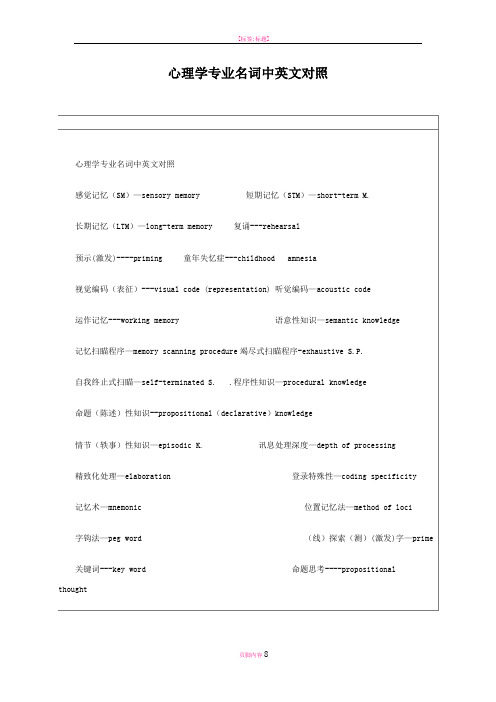
感觉动作期----sensorimotor stage 物永久性----objective permanence
运思前期----preoperational st. 保留概念----conservation
心理学专业名词中英文对照
心理学专业名词中英文对照
感觉记忆(SM)—sensory memory 短期记忆(STM)—short-term M.
长期记忆(LTM)—long-term memory 复诵---rehearsal
预示(激发)----priming 童年失忆症---childhood amnesia
发展------development 先天-----nature
后天-----nurture 成熟-------maturation
(视觉)偏好法-----preferential method
习惯法-----habituation 视觉悬崖-----visual cliff
剥夺或丰富(环境)---deprivation or enrichment of env. 基模----schema
概念---concept
原型----prototype 属性----property 特征---feature
范例策略--exemplar strategy 语言相对性(假说)—linguistic relativity th.
音素---phoneme 词素---morpheme
(字词的)外延与内涵意义—denotative & connotative meaning
气质----temperament 依附---attachment 性别认定---gender identity
《健康教育与健康促进知识点整理

《健康教育与健康促进》知识点整理第一类:名词解释1、健康:答案要点:健康不仅仅是没有疾病和衰弱的状态,而是一种在身体上、精神上和社会上的完好状态。
包括生理健康、精神健康(心理健康和道德健康)和社会适应完好。
2、三维健康观:答案要点:三维健康观是由生物、心理和社会三个基本侧面形成健康的三维立体概念即三维健康观。
3、疾病:答案要点:疾病是个体表现出自己感知或者他人观察、测量到的异常状态即身体功能不正常状态。
4、亚健康:答案要点:亚健康是由于生活工作学习等方面的压力引起的介于健康与疾病之间的中间状态。
5、健康教育:答案要点:健康教育是以传播、教育、干预为手段,以帮助个体和群体改变不健康行为,建立健康行为为目标,促进健康为目的而进行的一系列活动及其过程。
6、健康促进:答案要点:健康促进是促使人们维护和提高他们自身健康的过程,是协调人类与环境之间的战略,规定个人与社会对健康各自所负的责任。
7、行为:答案要点:行为是具有认知、思维能力并且有情感、意志等心理活动的人,对于内外环境因素刺激所作出的能动的反应。
8、健康相关行为:答案要点:是指个体或者团体的与健康和疾病有关的行为,包括促进健康行为和危害健康行为。
大量流行病学研究证实人类的行为、生活方式与绝大多数的慢性非传染性疾病关系极为密切,改善行为可以预防这些疾病的发生和有利于疾病的治疗,感染性疾病、意外伤害和职业危害的预防控制也与人们的行为密切相关。
9、促进健康行为:答案要点:促进健康行为指个体或者团体的客观上有利于自身和他人健康的行为。
10、危害健康行为:答案要点:危害健康行为是个体和群体在偏离个人、他人、社会的期望方向上表现的一组行为。
11、心理健康概念:答案要点:心理健康是心理上的健康状态,整个心理活动和心理特征相对稳定,相对协调,充分发展,与客观环境统一和适应。
人体处于这种状态时不仅自我感觉良好,而且与社会契合、和谐。
12、情绪:答案要点:情绪是人们认识客观事物时对其态度的体验,是人体与环境意义事件之间关系的反映。
心理学必会英文单词

心理学psychology心理现象mental phenomenon心理过程mental process心理状态mental state心理活动mental activity意识consciousness心理维度psychological dimension心理运动psychomotor内部活动internal activity普通心理学general psychology实验心理学experimental psychology行为科学behavioral science心身关系mind-body relation心理机能定位localization of mental function心理能动性mental activism外周论peripheralism先天理论nativistic theory强调遗传素质决定人心理的产生与发展。
遗传heredity目的论teleology认为生物和人类的活动受一定目的的引导。
活动activity活动理论activity theory认知心理学cognitive psychology认知cognition相对于情感、意志等心理过程的所有认识过程的总称。
包括知觉、注意、表象、学习记忆、问题解决、思维和言语等心理过程。
认知过程cognitive process认知结构cognitive structure元认知metacognition认知失调cognitive dissonance认知地图cognitive map认知技能cognitive skill认知方式cognitive style信息information信息论information theory信息加工information processing信息加工心理学information processing psychology信息加工理论information processing theory信息加工模型information processing model中央处理器模型central processor model信息储存information storage信息提取information retrieval人工智能artificial intelligence, AI计算机类比computer analogy计算机模拟computer simulation计算机模型computer model唯心主义心理学idealistic psychology意动心理学act psychology唯意志论voluntarism唯灵论spiritualism强调超自然精神作用。
apesk-pstr心理压力量表英文版

心理压力是一种普遍存在的心理现象,对个体的身心健康会产生一定影响。
为了更全面、客观地评估个体的心理压力水平,心理学家们设计出了各种心理压力量表。
其中,APESK-PSTR心理压力量表是一个较为常用的量表之一,其英文版对于国际交流和研究具有重要意义。
在本文中,我们将对APESK-PSTR心理压力量表的英文版进行介绍,包括该量表的背景、设计原则、评估方法、评估内容、应用范围、国际影响等方面的内容,旨在为专业人士和对心理压力量表感兴趣的个人提供一份全面而准确的参考资料。
一、APESK-PSTR心理压力量表的背景APESK-PSTR心理压力量表是由美国心理学家在20世纪70年代初期设计出来的,旨在评估个体在面临各种压力因素时的心理应对能力和压力水平。
该量表的设计背景主要包括以下几个方面:1. 心理学研究的需要:心理压力是一个复杂而多样的心理现象,对其进行科学评估需要一个系统性、客观性的量表。
2. 心理健康的促进:心理压力对个体的身心健康有明显的影响,因此需要一个有效的评估工具来及时发现和干预心理压力问题。
3. 国际化的需求:随着全球化的进程,心理学研究需要一个国际通用的量表来进行比较和交流,因此需要一份英文版的心理压力量表。
二、APESK-PSTR心理压力量表的设计原则APESK-PSTR心理压力量表的设计遵循着一系列科学的原则,这些原则保证了该量表的信度和效度,具有较高的研究和实践价值。
1. 量表的全面性:该量表包括了生活、工作、学习等各个方面的压力因素,涵盖了个体在不同环境下的心理压力体验。
2. 量表的客观性:该量表的设计尽量避免了主观性和个人偏见,通过客观的观察指标和行为表现对心理压力进行评估。
3. 量表的标准化:量表的设计和使用遵循着统一的标准和程序,确保了结果的可比性和一致性。
4. 量表的实用性:该量表的设计考虑了实际应用的需要,使评估结果具有较强的指导性和可操作性。
三、APESK-PSTR心理压力量表的评估方法APESK-PSTR心理压力量表的评估方法主要包括定性和定量两种方法,两者相结合可以更全面地评估个体的心理压力水平。
高职高专心理学词汇表

高职高专心理学词汇表1. 自尊 (self-esteem)指一个人对自己的价值和能力的评价和认知。
自尊对于一个人的心理健康和自信心至关重要。
2. 压力 (stress)指由于面临各种挑战、困难或紧张情况而引起的身心反应。
压力可能对人的身心健康产生负面影响,但适度的压力也能激发个人的潜力。
3. 焦虑 (anxiety)指由于对未来的担忧、紧张和不安所导致的情绪和心理状态。
焦虑可能会干扰人们的日常生活和工作,需要适当的管理和应对策略。
4. 抑郁 (depression)指一种持续的情绪状态,包括消沉、悲伤和失去兴趣等。
抑郁可能影响人的心理健康和日常功能。
5. 共情 (empathy)指理解和分享他人情感及体验的能力。
共情有助于建立良好的人际关系和沟通,增强人与人之间的亲密度和理解。
6. 倾听 (active listening)指全神贯注地聆听他人讲话并展示出兴趣和理解。
倾听是有效沟通和建立互信关系的关键技巧。
7. 冲突解决 (conflict resolution)指解决个人或团体之间矛盾和分歧的过程。
有效的冲突解决能力有助于促进和谐的人际关系和团队合作。
8. 积极心态 (positive mindset)指积极看待事物、保持乐观态度和寻找解决问题的机会的心理状态。
积极心态有助于应对困难和促进个人成长。
9. 自我调节 (self-regulation)指控制和管理个人的情绪、冲动和行为的能力。
良好的自我调节能力有助于提高个人的幸福感和心理健康。
10. 幸福感 (well-being)指个人感受到的生活满意度和幸福程度。
幸福感与个人的心理和情绪状态密切相关。
以上是一份高职高专心理学词汇表,包括了一些重要的心理学概念和术语。
这些词汇可以帮助人们更好地理解和研究心理学领域的知识。
心理学英文期刊

1 Journal of personality and social psychology 个性与社会心理学杂志美2 Psychological bulletin心理学公报美(11)3 Psychological review心理学评论美4 Behavioral & brain sciences 行为与大脑科学英5 Psychological reports 心理学报告美6 Journal of consulting and clinical psychology 咨询心理学与临床心理学杂志美7 Perceptual motor skills 感知与运动技能英8 Psychological medicine 心理医学美9 Journal of cognitive neuroscience 认知神经科学杂志美10 Journal of experimental psychology.Learning,memory,and cognition 实验心理学杂志.学习、记忆和认识美11 Journal of abnormal psychology 变态心理学杂志美12 Developmental psychology 发展心理学美13 Psychosomatic medicine 身心医学美14 Journal of experimental psychology.Human perception and performance实验心理学杂志.人类知觉与行为美15 Personality and individual differences 个性与个体差异英16 Psychophysiology 心理生理学英17 Annual review of psychology 心理学年度评论美18 Behaviour research and therapy 行为研究和治疗英19 Pharmacology, biochemistry and behavior 药理学、生物化学和行为美20 Journal of applied psychology 应用心理学杂志美21 Journal of memory and language 记忆与语言杂志美22 The Journal of child psychology and psychiatry & allied disciplines 儿童心理学、精神病学及相关学科杂志英23 Journal of affective disorders 情感紊乱杂志荷兰24 Cognitive psychology 认知心理学美25 Psychological science 心理科学美26 Cognition 认知荷兰27 Health psychology 健康心理学美28 Brain research 大脑研究荷兰29 Perception & psychophysics 知觉与心理学美30 Personality & social psychology bulletin 个性与社会心理学公报美31 Vision research 视觉研究英32 Psychopharmacology bulletin 精神鞠理学公报美33 Journal of studies on alcohol 酒精研究杂志美34 Psychology and aging 心理学与衰老美35 Brain and language 大脑与语言美36 Memory and cognition 记忆与认知美37 Journal of psychosomatic research 身心研究杂志美38 Journal of experimental psychology. General 实验心理学杂志.总论美39 International journal of eating disorders 国际进食障碍杂志美40 Journal of educational psychology 教育心理学杂志美41 American psychologist 美国心理学家美42 Professional psychology, research and practice专业专理学,研究及实践美43 Child abuse & neglect 虐待与忽视儿童研究英44 Neuropsychology 神经心理学美45 Organizational behavior and human decision processes 组织行为与人类决策过程美46 Behavioural brain research 行为大脑研究荷兰47 Journal of applied behavior analysis应用行为分析杂志美48 Perception 知觉英49 Behavior therapy 行为治疗美50 Psychological assessment 心理评价美51 Journal of abnormal child psychology 变态儿童心理学杂志美52 Journal of counseling psychology 咨询心理学杂志美53 Journal of personality assessment 个性评估杂志美54 Journal of traumatic stress 创伤应激反应杂志美55 Cognitive neuropsychology 认知神经心理学英56 Ethology 行为学德57 Ergonomics 人机学英58 Journal of experimental child psychology 实验儿童心理学杂志美59 Law and human behavior 法律和人类行为美60 Sex roles 性别作用美61 Journal of vocational behavior 职业行为杂志美62 Journal of personality 个性杂志美63 Addictive behaviors 成瘾行为英64 Journal of experimental social psychology 实验社会心理学杂志美65 Journal of comparative psychology 比较心理学杂志美66 The International journal of psycho-analysis 国际心理分析杂志英67 Cognitive therapy and research 认知治疗与研究美68 Clinical psychology review 临床心理学评论英69 Journal of sport & exercise psychology运动与训练心理学杂志美70 Educational and psychological measurement 教育与心理测量英71 British journal of clinical psychology英国临床心理学杂志英72Journal of experimental psycholoy Animal behaviorprocesses 实验心理学杂志.动物行为过程美73 British journal of psychology 英国心理学杂志英74 Behavior researchmethods,instruments & computers 行为研究方法、仪器与计算机英75 Social psychology quarterly 社会心理学季刊美76 European journal of social psychology欧洲社会心理学杂志英77 Infant behavior & development 婴儿行为与发育美78 Neuropsychologia 神经心理学英79 Journal of pediatric psychology 儿科心理学杂志英80 Behavioral neuroscience 行为神经科学美81 The Journal of social psychology 社会心理学杂志美82 Cognitive science 认知科学美83 Journal of clinical child psychology临床儿童心理学杂志美84 Biological psychology 生物心理学荷兰85 Psychobiology 心理生物学美86 American journal of psychology 美国心理学杂志美87 Brain and cognition 大脑与认知美88 Language and cognitive processes 语言与认知过程英89 Memory 记忆英90 Scandinavian journal of psychology 斯堪的纳维亚心理学杂志英。
生活中的英文字母缩写
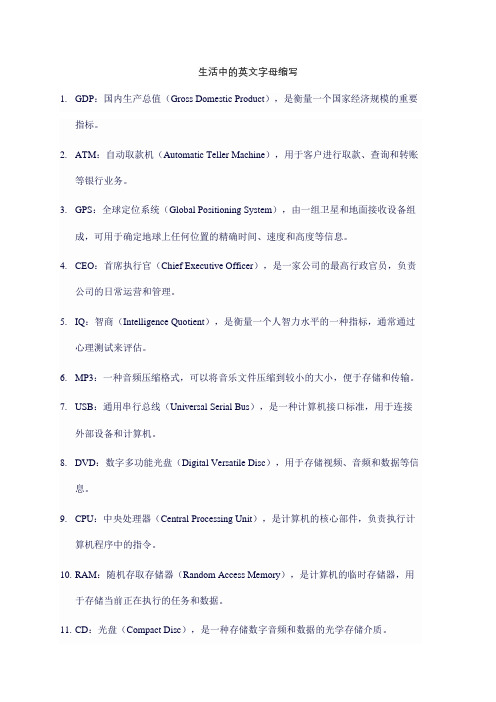
生活中的英文字母缩写1.GDP:国内生产总值(Gross Domestic Product),是衡量一个国家经济规模的重要指标。
2.ATM:自动取款机(Automatic Teller Machine),用于客户进行取款、查询和转账等银行业务。
3.GPS:全球定位系统(Global Positioning System),由一组卫星和地面接收设备组成,可用于确定地球上任何位置的精确时间、速度和高度等信息。
4.CEO:首席执行官(Chief Executive Officer),是一家公司的最高行政官员,负责公司的日常运营和管理。
5.IQ:智商(Intelligence Quotient),是衡量一个人智力水平的一种指标,通常通过心理测试来评估。
6.MP3:一种音频压缩格式,可以将音乐文件压缩到较小的大小,便于存储和传输。
B:通用串行总线(Universal Serial Bus),是一种计算机接口标准,用于连接外部设备和计算机。
8.DVD:数字多功能光盘(Digital Versatile Disc),用于存储视频、音频和数据等信息。
9.CPU:中央处理器(Central Processing Unit),是计算机的核心部件,负责执行计算机程序中的指令。
10.RAM:随机存取存储器(Random Access Memory),是计算机的临时存储器,用于存储当前正在执行的任务和数据。
11.CD:光盘(Compact Disc),是一种存储数字音频和数据的光学存储介质。
12.DSL:数字用户线(Digital Subscriber Line),是一种宽带互联网接入技术,通过电话线提供高速的数据传输服务。
13.SUV:运动型多用途车(Sport Utility Vehicle),是一种具有越野车性能和多功能用途的汽车。
14.CEO:首席运营官(Chief Operating Officer),主要负责公司的日常运营和管理,与首席执行官共同协作。
心理学专业名词中英文对照

感觉记忆(SM)—sensory memory短期记忆(STM)—short-term M。
长期记忆(LTM)—long-term memory复诵——rehearsal预示(激发)——priming童年失忆症——childhood amnesia视觉编码(表征)——visual code(representation)听觉编码—acoustic code运作记忆——working memory语意性知识—semantic knowledge记忆扫瞄程序—memory scanning procedure竭尽式扫瞄程序-exhaustive S.P。
自我终止式扫瞄—self-terminated S。
程序性知识—procedural knowledge命题(陈述)性知识——propositional(declarative)knowledge 情节(轶事)性知识—episodic K。
讯息处理深度—depth of processing精致化处理—elaboration登录特殊性—coding specificity记忆术—mnemonic位置记忆法—method of loci字钩法—peg word(线)探索(测)(激发)字—prime关键词——key word命题思考——propositional thought心像思考——imaginal thought行动思考——motoric thought概念——concept原型——prototype属性——property特征——feature范例策略——exemplar strategy语言相对性(假说)—linguistic relativity th。
音素——phoneme词素——morpheme(字词的)外延与内涵意义—denotative & connotative meaning (句子的)表层与深层结构—surface & deep structure语意分析法——semantic differential全句语言—holophrastic speech过度延伸——over-extension电报式语言—telegraphic speech关键期——critical period差异减缩法——difference reduction方法目的分析——means-ends analysis倒推——working backward动机——motive自由意志——free will决定论——determinism本能——instinct种属特有行为——species specific驱力——drive诱因——incentive驱力减低说——drive reduction th。
心理咨询师英文单词
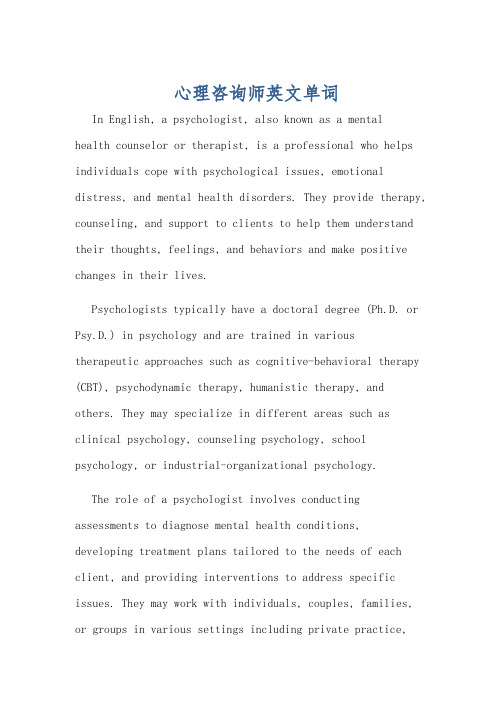
心理咨询师英文单词In English, a psychologist, also known as a mentalhealth counselor or therapist, is a professional who helps individuals cope with psychological issues, emotional distress, and mental health disorders. They provide therapy, counseling, and support to clients to help them understand their thoughts, feelings, and behaviors and make positive changes in their lives.Psychologists typically have a doctoral degree (Ph.D. or Psy.D.) in psychology and are trained in varioustherapeutic approaches such as cognitive-behavioral therapy (CBT), psychodynamic therapy, humanistic therapy, and others. They may specialize in different areas such as clinical psychology, counseling psychology, school psychology, or industrial-organizational psychology.The role of a psychologist involves conducting assessments to diagnose mental health conditions,developing treatment plans tailored to the needs of each client, and providing interventions to address specific issues. They may work with individuals, couples, families,or groups in various settings including private practice,hospitals, community mental health centers, schools, and businesses.Psychologists use a range of therapeutic techniques to help clients improve their mental health and well-being. These may include talk therapy, behavior modification, relaxation techniques, mindfulness exercises, and other evidence-based interventions. They also collaborate with other healthcare professionals such as psychiatrists,social workers, and primary care physicians to ensure comprehensive care for their clients.In addition to providing therapy, psychologists may also engage in research, teaching, consulting, and advocacy related to mental health issues. They contribute to the development of new treatment approaches, conduct studies to better understand psychological phenomena, and educate the public about mental health awareness and prevention.Overall, psychologists play a vital role in promoting mental health and helping individuals lead fulfilling lives. Through their expertise and compassion, they empowerclients to overcome challenges, build resilience, and achieve personal growth and self-fulfillment.中文翻译:在英文中,心理学家,也被称为心理健康咨询师或治疗师,是一种帮助个人应对心理问题、情绪困扰和心理健康障碍的专业人士。
GRE Psychology Test 中文版

(3)社会比较、自我 (4)情绪、情感和动机 (5)从众、他人影响和说服 (6)人际吸引和亲密关系 (7)组间组内进程 (8)文化和性别的影响 (9)进化心理学、利他和暴力 (10)理论、应用和争论点
三、其他领域——(17%) 1. 通论(4-6%) (1)历史 (2)工业组织 (3)教育 2. 测量和方法(11-13%) (1)心理测量学、问卷建立、信度、 效度 (2)实验设计 (3)数据处理 (4)科学方法和证据评估 (5)伦理与法律问题 (6)分析并阐述实验结果
*原始分=正确题目数减去错误题目数的四分之一,四舍五入取整数。 对于特定的考试版本,有很多可能得到相同的原始分。比如上面的某测试 A 中,原始分 116~118 都会得到 600 分。下面是几个可能得到 600 分标准分的情况: 得到标准分 600 分的几种可能情况的例子 原始分 116 116 116 118 118 118 答对题目数 116 125 134 118 126 135 答错题目数 0 35 70 0 34 67 未答题目数 88 44 0 86 44 2 题目数 204 204 204 204 204 204
GRE 单科考试的目的
GRE 单科考试旨在帮助研究生院录取委员会和奖学金资助者评估申请者某个特定学科 的水平。本考试也可以为学生提供测试学科水平的科学方法。 这个考试的分数对学生在这个学科的知识有预测力, 这些本科项目中的知识在为研究生 学习打基础。由于考试成绩往往能预测今后的学习表现,GRE 单科成绩能一定程度上预测 学生在研究生学习中的表现。因为考试是标准化的,成绩就可以对不同机构、不同本科项目 进行横向对比。有的单科考试,除了提供总分外还提供分类得分;这些分类得分表明学生的 强项和弱项,对于未来学习的规划很有帮助。 GRE 委员会建议,单科的考试成绩应该和申请者的其他相关信息综合进行考虑。因为 有很多因素会影响研究生院学习的成败, 单单靠一个因素来预测成败并不可靠。 其他表明能 力的因素通常有本科成绩单(上面有选课情况和得分情况) 、推荐信和 GRE 综合测试成绩。 如果需要有关如何运用 GRE 成绩的信息, 请看 GRE 分数使用向 /gre/stupubs
心理学常考的英文名词解释

心理学常考的英文名词解释在心理学常考的英文名词中,有许多重要且具有深度的概念,这些概念涉及到人类思维、行为和情绪等方面。
在本篇文章中,我们将探讨其中一些常见的英文名词,并对其进行解释,帮助读者更好地理解和掌握这些概念。
1. Perception(知觉)Perception是指通过感觉器官对外部刺激进行信息加工和解释的过程。
在知觉过程中,人们通过感觉器官(如眼睛、耳朵、皮肤)接收外部刺激,并将其转化为可理解的感知经验。
这种经验的形成是由感官刺激、个体的经验和知识以及环境因素相互作用所决定的。
知觉在认知过程中扮演着重要的角色,它影响了我们对世界的理解和感知。
2. Attention(注意力)Attention是指个体有意识地将注意力集中在某个特定的对象或刺激上的能力。
人类的注意力有限,我们需要选择性地将注意力集中在某些特定的刺激上,而忽略其他的刺激。
注意力的变化有助于我们处理复杂的信息,并且能够提高认知和行为的效果。
不同的注意力分配方式会对认知和情绪产生不同的影响,因此,对于不同任务和环境,合理地管理注意力是非常重要的。
3. Memory (记忆)Memory是指人类对过去经历的信息和经验的存储和回忆能力。
记忆可以分为短期记忆和长期记忆两种类型。
短期记忆是临时存储信息的能力,它有限且容易消失,而长期记忆则是持久存储信息的能力,它的容量和时效性较大。
记忆对于认知和学习至关重要,它使我们能够在新的环境中快速适应和利用以往的经验。
4. Emotion (情绪)Emotion是指个体对内外刺激产生的、带有主观感受的生理和心理反应。
情绪通常包括愉快和不愉快的心理状态,如快乐、悲伤、愤怒和害怕等。
情绪对我们的认知、行为和健康产生深远的影响。
通过情绪的表达和感受,我们可以更好地理解自己和他人,也可以调节自己的行为和对世界的态度。
5. Intelligence(智力)Intelligence是指个体理解和适应环境、解决问题和学习新知识的能力。
西医疼痛科术语英文翻译
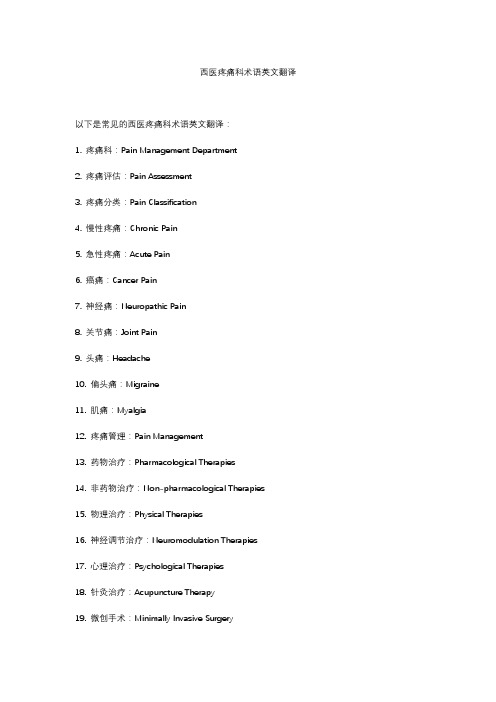
西医疼痛科术语英文翻译以下是常见的西医疼痛科术语英文翻译:1. 疼痛科:Pain Management Department2. 疼痛评估:Pain Assessment3. 疼痛分类:Pain Classification4. 慢性疼痛:Chronic Pain5. 急性疼痛:Acute Pain6. 癌痛:Cancer Pain7. 神经痛:Neuropathic Pain8. 关节痛:Joint Pain9. 头痛:Headache10. 偏头痛:Migraine11. 肌痛:Myalgia12. 疼痛管理:Pain Management13. 药物治疗:Pharmacological Therapies14. 非药物治疗:Non-pharmacological Therapies15. 物理治疗:Physical Therapies16. 神经调节治疗:Neuromodulation Therapies17. 心理治疗:Psychological Therapies18. 针灸治疗:Acupuncture Therapy19. 微创手术:Minimally Invasive Surgery20. 脊柱外科手术:Spinal Surgery21. 关节镜手术:Arthroscopic Surgery22. 硬膜外注射治疗:Epidural Injection Therapy23. 神经阻滞治疗:Nerve Block Therapies24. 射频消融治疗:Radiofrequency Ablation Therapy25. 疼痛教育:Pain Education26. 疼痛康复:Pain Rehabilitation27. 疼痛护理:Pain Nursing28. 疼痛患者自我管理:Self-management for Pain Patients29. 疼痛管理药物经济学:Pharmacoeconomics of Pain Management30. 疼痛管理伦理学:Ethics of Pain Management31. 疼痛管理法律问题:Legal Issues in Pain Management32. 疼痛管理心理学:Psychology of Pain Management33. 疼痛管理多学科合作:Multidisciplinary Collaborations in Pain Management34. 疼痛管理临床实践指南:Clinical Practice Guidelines for Pain Management35. 阿片类药物耐受性与成瘾性管理:Opioid Tolerance and Addiction Management36. 药物治疗安全性监测与管理:Drug Safety Monitoring and Management in Pain Management37. 非药物治疗有效性评估与实施:Evaluation and Implementation of Non-pharmacological Interventions for Pain Management38. 慢性疼痛的预防与管理策略:Prevention and Management Strategies for Chronic Pain39. 癌痛的多学科综合治疗与管理:Multidisciplinary Comprehensive Cancer PainManagement40. 神经痛的治疗与管理策略:Treatment and Management Strategies for Neuropathic Pain41. 关节痛的物理治疗与管理策略:Physical Therapies and Management Strategies for Joint Pain42. 头痛的诊断与治疗策略:Diagnostic and Therapeutic Strategies for Headache Disorders43. 肌痛的非药物治疗与管理策略:Non-pharmacological Interventions and Management Strategies for Myalgia44. 疼痛管理的患者教育与支持系统建设:Patient Education and Support System Development in Pain Management45. 基于互联网的远程疼痛管理解决方案:Internet-based Remote Pain Management Solutions46. 人工智能在疼痛管理中的应用与前景:Application and Prospects of Artificial Intelligence in Pain Management47. 社会心理因素对疼痛感知与耐受性的影响研究:Studies on the Impact of Psychosocial Factors on Pain Perception and Tolerance48. 个体化疼痛治疗方案的研究与实践进展:Research and Practical Advances in Personalized Pain Management Strategies49. 儿童与老年人的特殊疼痛问题及管理策略研究:Studies on Special Pain Problems and Management Strategies in Children and Elderly Adults50. 国际疼痛管理领域的最新研究动态与合作项目:Recent Research Developments and Collaborative Projects in International Pain Management。
中英文--西医精神科术语英文翻译

西医精神科术语英文翻译以下是常见的西医精神科术语英文翻译:1. 焦虑症:Anxiety Disorders2. 抑郁症:Depression3. 精神分裂症:Schizophrenia4. 双相情感障碍:Bipolar Disorder5. 创伤后应激障碍:Post-Traumatic Stress Disorder (PTSD)6. 强迫症:Obsessive-Compulsive Disorder (OCD)7. 失眠症:Insomnia8. 嗜睡症:Hypersomnia9. 睡眠障碍:Sleep Disorders10. 神经衰弱:Neurasthenia11. 精神发育迟滞:Mental Retardation12. 自闭症谱系障碍:Autism Spectrum Disorders (ASD)13. 注意缺陷多动障碍:Attention Deficit Hyperactivity Disorder (ADHD)14. 抽动症:Tic Disorders15. 创伤性脑损伤:Traumatic Brain Injury (TBI)16. 进食障碍:Eating Disorders17. 物质滥用:Substance Abuse18. 心理治疗:Psychotherapy19. 药物治疗:Pharmacotherapy20. 电休克疗法:Electroconvulsive Therapy (ECT)21. 支持性心理治疗:Supportive Psychotherapy22. 暴露疗法:Exposure Therapy23. 认知行为疗法:Cognitive Behavioral Therapy (CBT)24. 人际关系疗法:Interpersonal Therapy (IPT)25. 心理疏导:Psychological Counseling26. 精神科会诊:Psychiatric Consultation27. 心理评估:Psychological Evaluation28. 心理测验:Psychological Testing29. 精神卫生机构:Mental Health Facilities30. 心理健康促进活动:Mental Health Promotion Activities31. 精神疾病预防:Mental Illness Prevention32. 心理健康干预措施:Mental Health Intervention Measures33. 心理疏导热线:Psychological Counseling Hotline34. 心理健康服务:Mental Health Services35. 精神卫生保健工作者:Mental Health Care Workers36. 心理疾病患者支持团体:Support Groups for People with Mental Illnesses37. 精神卫生法:Mental Health Law38. 心理健康政策:Mental Health Policies39. 精神卫生运动:Mental Health Initiatives40. 心境障碍:Mood Disorders (MDs)。
心理评估的过程英语作文

心理评估的过程英语作文Psychological Assessment Process。
Psychological assessment is a process of evaluating an individual's cognitive, emotional and behavioral functioning. It is an important tool used by psychologists to understand an individual's mental health status and to develop appropriate interventions. The process of psychological assessment includes several steps that are designed to gather information about an individual's psychological functioning.The first step in the psychological assessment process is to gather information about the individual's history. This includes information about the individual's medical history, family history, educational background, and social history. This information is important in understanding the individual's current psychological functioning and can help to identify any potential risk factors.The next step in the process is to administer psychological tests. These tests are designed to assess an individual's cognitive, emotional, and behavioral functioning. There are many different types of psychological tests that can be used, includingintelligence tests, personality tests, and neuropsychological tests. The tests are administered by a trained psychologist or other mental health professional and are designed to provide objective information about the individual's psychological functioning.After the tests have been administered, the psychologist will analyze the results and develop a psychological profile of the individual. This profile will include information about the individual's strengths and weaknesses, as well as any potential risk factors for mental health problems. The psychologist will then use this information to develop a treatment plan that is tailored to the individual's specific needs.The final step in the psychological assessment process is to provide feedback to the individual. The psychologistwill discuss the results of the assessment with the individual and provide recommendations for treatment. This feedback is important in helping the individual to understand their psychological functioning and to develop a plan for improving their mental health.In conclusion, psychological assessment is an important tool used by psychologists to understand an individual's mental health status and to develop appropriate interventions. The process of psychological assessment includes several steps that are designed to gather information about an individual's psychological functioning. By using this information, psychologists are able todevelop treatment plans that are tailored to theindividual's specific needs.。
一般决策效能感量表GSES

一般决策效能感量表GSES简介一般决策效能感量表(General Self-Efficacy Scale,GSES)是一种常用的心理测量工具,用于评估个体在面对各种决策情境时的信心和能力感受。
本文档将对GSES进行详细介绍。
测量内容GSES由10个陈述性项(如自信程度等)组成,被测者需要根据自己的感受,通过5级量表(从1表示“完全不同意”到5表示“非常同意”)进行评分。
这些陈述性项的评分将汇总为总分,用于度量个体的一般决策效能感。
应用领域GSES在心理学研究和应用中被广泛使用,特别适用于评估个体在决策情境中的信心和能力感受。
它可以用于研究个体的决策行为、情绪状态和应对能力,也可在教育、职业咨询和心理治疗等领域用于个体的心理评估和干预。
优点- 简洁有效:GSES由少量陈述性项构成,测量过程简单,易于实施,能够快速获取个体一般决策效能感的评估结果。
简洁有效:GSES由少量陈述性项构成,测量过程简单,易于实施,能够快速获取个体一般决策效能感的评估结果。
- 广泛适用:GSES适用于不同年龄段、不同文化背景和不同人群的个体,具有良好的适应性和普遍性。
广泛适用:GSES适用于不同年龄段、不同文化背景和不同人群的个体,具有良好的适应性和普遍性。
- 可靠可测量:GSES经过广泛的实证研究验证,具有较好的信度和效度,测量结果可靠可靠性高,具有较高的预测能力。
可靠可测量:GSES经过广泛的实证研究验证,具有较好的信度和效度,测量结果可靠可靠性高,具有较高的预测能力。
局限性- 自报性偏倚:GSES采用自我评价的方式进行测量,受到被试者主观感受和记忆状态等因素的影响,存在一定的自报性偏倚风险。
自报性偏倚:GSES采用自我评价的方式进行测量,受到被试者主观感受和记忆状态等因素的影响,存在一定的自报性偏倚风险。
- 文化和语言差异:GSES的原版是用英文编制的,经过翻译和适应性调整后在不同文化背景下应用。
然而,由于文化和语言的差异,翻译的准确性和测量结果的等效性可能存在一定的限制。
- 1、下载文档前请自行甄别文档内容的完整性,平台不提供额外的编辑、内容补充、找答案等附加服务。
- 2、"仅部分预览"的文档,不可在线预览部分如存在完整性等问题,可反馈申请退款(可完整预览的文档不适用该条件!)。
- 3、如文档侵犯您的权益,请联系客服反馈,我们会尽快为您处理(人工客服工作时间:9:00-18:30)。
3rd:
Establish a procedure for program evaluation
Identify What Yo源自 Are Trying To Do
Some examples: •Change attitudes about math and engineering •Increase girls’ sense of self-efficacy in math and engineering
Identify what you are trying to do. This may include general outcomes and specific outcomes. For example:
•Increase the number of women entering the fields of math and engineering (general)
•Improve high school girls attitudes about math and engineering (specific) 2nd: Identify ways to accurately assess whether these outcomes are occurring.
Educational Assessment
Assessment Issues and Program Evaluation Procedures
Outcomes Assessment
a.k.a
1st:
How Do I Know If I’m Doing What I Think I’m Doing?
Types of Reliability
•Test-Retest •Correlation of two tests taken on separate occasions by the same individual
•Limits: Practice effects, recall of former responses
Critical Issues for Assessment Tools
•Reliability
•Consistency of test scores •The extent to which performance is not affected by measurement error •Validity •The extent to which a test actually measures what it is supposed to measure
•Split-half
•Correlation between two halves of a test •Limits: Shortens test, which affects reliability, difficult with tests that measure different things in the same test (heterogeneous tests) •Kuder-Richardson and Coefficient Alpha •Inter-item consistency: Average correlation of each item with every other item •Limits: Not useful for hetergeneous tests
Types of Validity
•Content Validity
•Checking to make sure that you’ve picked questions that cover the areas you want to cover, thoroughly and well.
• Difficulties: “Adequate sampling of the item universe.” Important to ensure that all major aspects are covered by the test items and in the correct proportions •Specific Procedures: Content validity is built into the test from the onset through the choice of appropriate items.
•Alternate Form •Correlation of scores obtained on two parallel forms •Limits: May have practice effects, alternate forms often not available
Types of Reliability
•Improve motivation to engage in math and engineering
•Increase skills in math and engineering •Increase the number of girls who go on to major in math and engineering from your high school •Increase the number of women who graduate from college with math and engineering majors
Types of Validity
•Concurrent and Predictive Validity •Definition: The relationship between a test and some criteria. The practical validity of a test for a specific purpose. Examples: •Do high school girls who score high on this test go on to succeed in college as engineering majors? (P) •Do successful women engineering majors score high on this test? (C) •Difficulties: Criterion contamination; trainers must not know examinees’ test scores •Specific Procedures: infinite, based on purpose of the test
